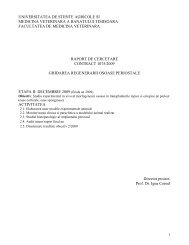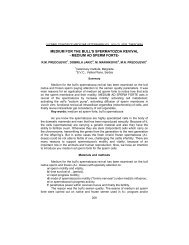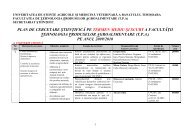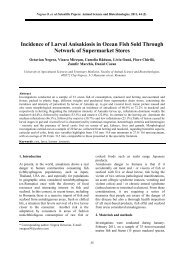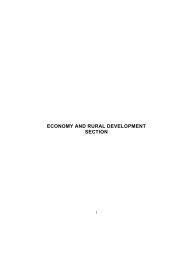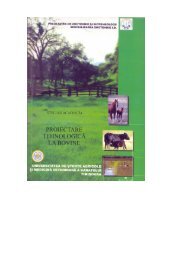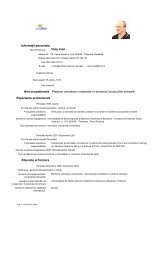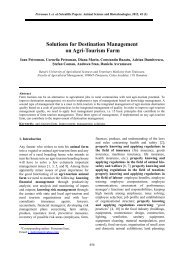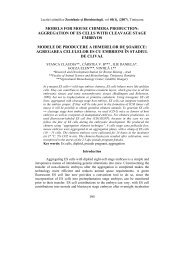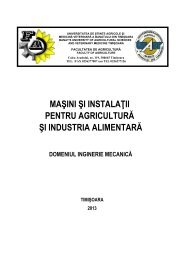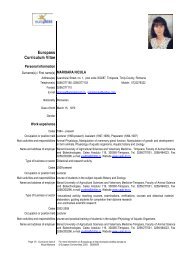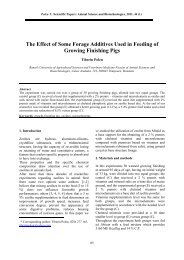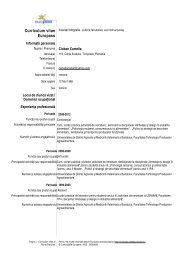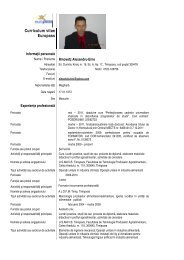journal of linguistic studies
journal of linguistic studies
journal of linguistic studies
Create successful ePaper yourself
Turn your PDF publications into a flip-book with our unique Google optimized e-Paper software.
- bodyguard / badigard (DOOM 2005): this word appeared with the phonetic<br />
spelling (badigard) in the Adevărul newspaper (October 26 th 1996), but at<br />
present the etymological variant is widely used in magazines and newspapers;<br />
- break / brec (DOOM);<br />
- clearing / cliring (DOOM 2005; DEX 1998);<br />
- clovn / claun (DOOM 2005);<br />
- cocktail / cocteil (DOOM 2005);<br />
- derby / derbi (DOOM 2005);<br />
- game/ ghem (DOOM 2005);<br />
- penalty / penalty (DOOM 2005);<br />
- roast beef / rosbif (DOOM);<br />
- sandvici / sendviş (DOOM 2005);<br />
- sandviş / sandvici / sanviş (DEX 1998) (the last two are optional spelling variants,<br />
the first one is recommended by DEX);<br />
- smash / smeş (DOOM 2005).<br />
The spelling <strong>of</strong> the borrowings clovn and brec was regulated in 1953 by a major<br />
spelling reform. Among the words that were subjected to the same process <strong>of</strong> regulation,<br />
there are also fotbal and chec.<br />
3.3. THE ASSIMILATION OF ENGLISH BORROWINGS<br />
Once a borrowing is assimilated into the receiving language, it loses the features <strong>of</strong><br />
the source language. These are taken over by those <strong>of</strong> the receiving language and<br />
sometimes the word can no longer be identified as a borrowing. This last stage comprises<br />
English borrowings that have a phonetic spelling. They have entered everyday speech and<br />
have been assimilated from a phonological point <strong>of</strong> view: cec, fotbal, henţ, scheci, volei,<br />
hochei, seif, buget, and also some “corrupted” forms: blugi, bişniţă, ciungă, dangarezi,<br />
gref (these forms are criticized by linguists and are specific to colloquial speech)<br />
Lyutakova (2004) also refers to the backward/inverted adaptation. Some<br />
orthographically assimilated borrowings are being used nowadays with their original,<br />
etymological spelling (the phonetic spelling is replaced with the etymological one):<br />
- cnocdaun, cnocaut (DEX) → knockdown, knockout (DOOM);<br />
- hailaif (DEX 1998) → high-life (DOOM 2005);<br />
- jaz (DEX) → jazz (DOOM);<br />
- şalanger (DEX) → challenger (DOOM).<br />
In the same article in Romanoslavica magazine, Lyutakova (2004) renders<br />
perspicuous the matter <strong>of</strong> double letters (graphemes). The orthographical rules <strong>of</strong><br />
Romanian demand that double consonants be written only where they render a phonetic<br />
reality like in accelera, accent. There are many English borrowings whose spelling is<br />
characterized by a double letter (double consonant) (Lyutakova 2004). She also states that<br />
the groups <strong>of</strong> identical letters are the first to be subjected to the process <strong>of</strong> adaptation.<br />
They can be divided into three classes:<br />
- borrowings that have preserved the double consonants: business, bluff, hobby,<br />
reggae, summit, scrabble, thriller, lobby, banner (DOOM 2005);<br />
- borrowings that display variants: stress (MDN 2002) / stres (DOOM, MDN<br />
2002), boss / bos (DOOM 2005), rapper / raper (MDN 2002), uppercut (MDN<br />
2002) / upercut (DOOM, MDN);<br />
32



